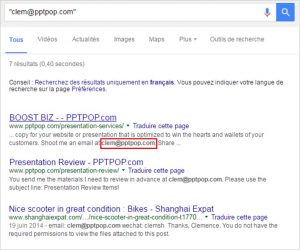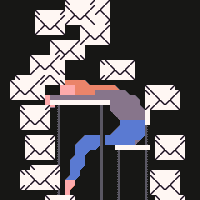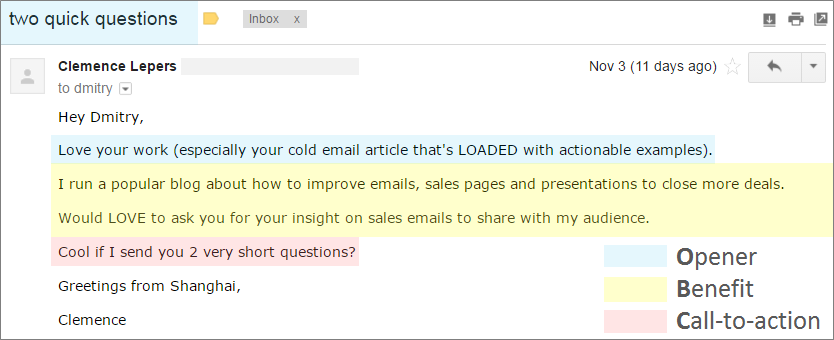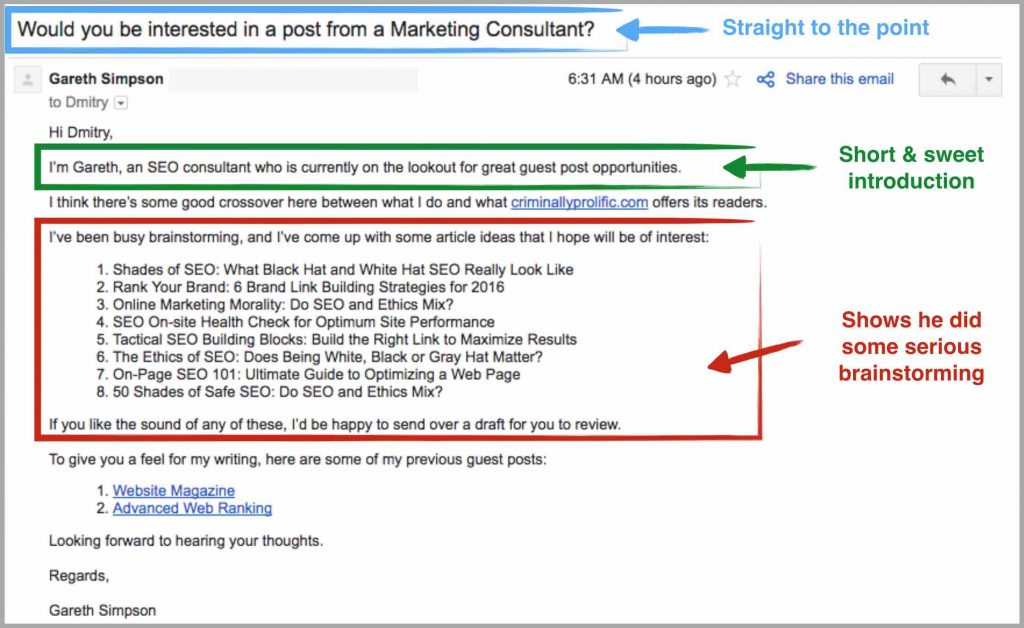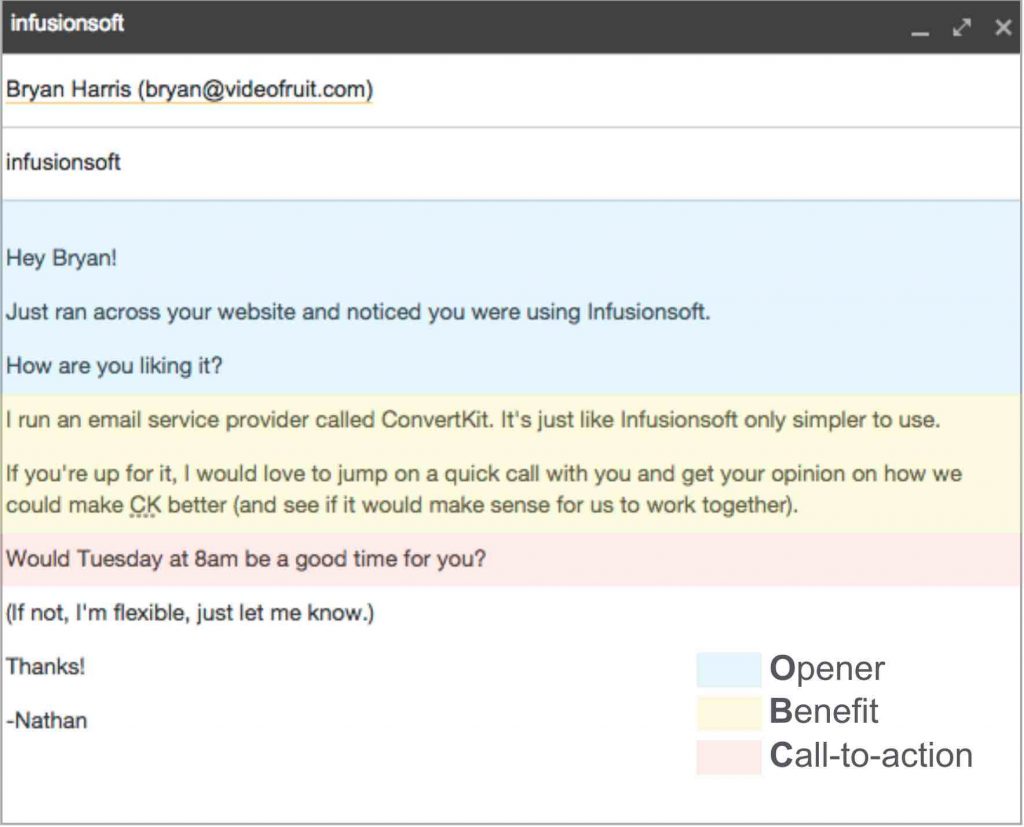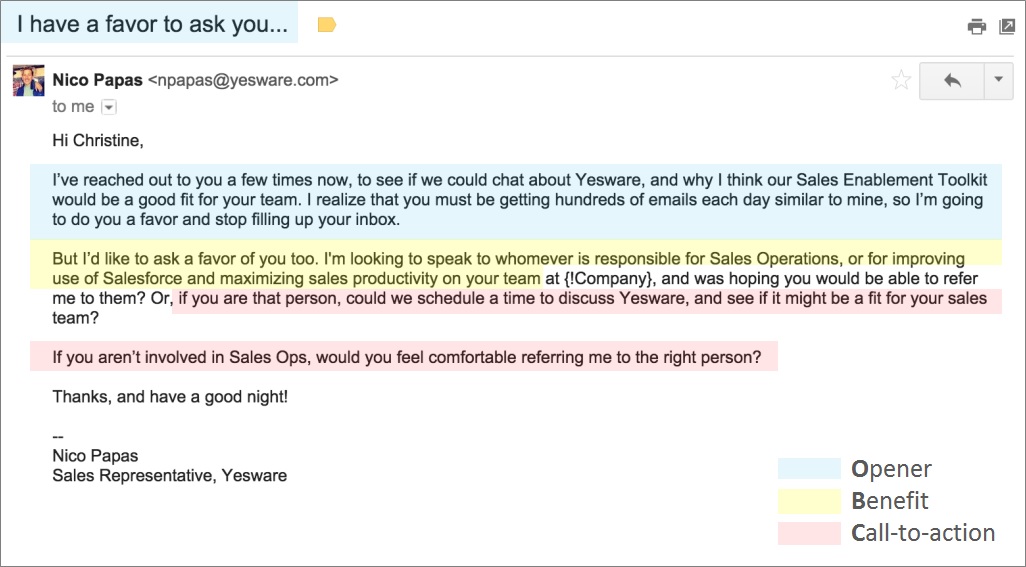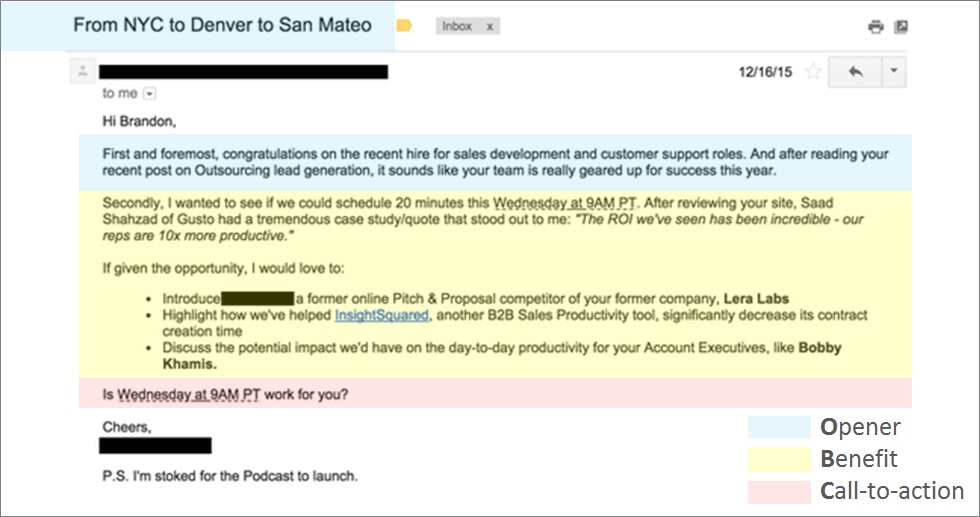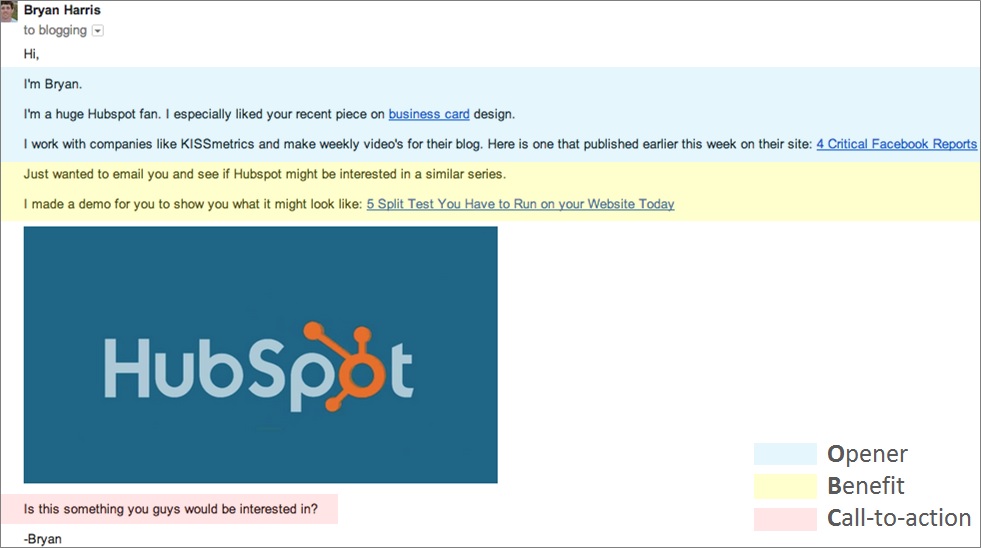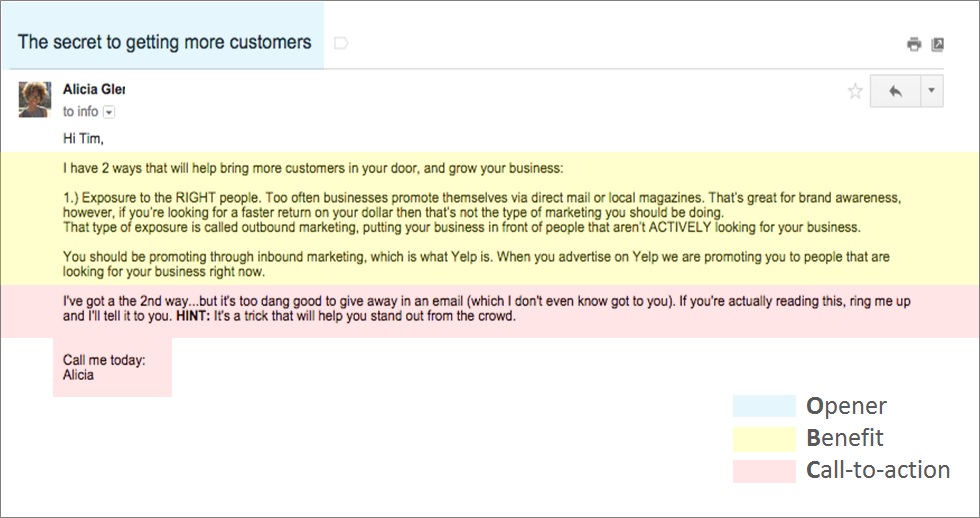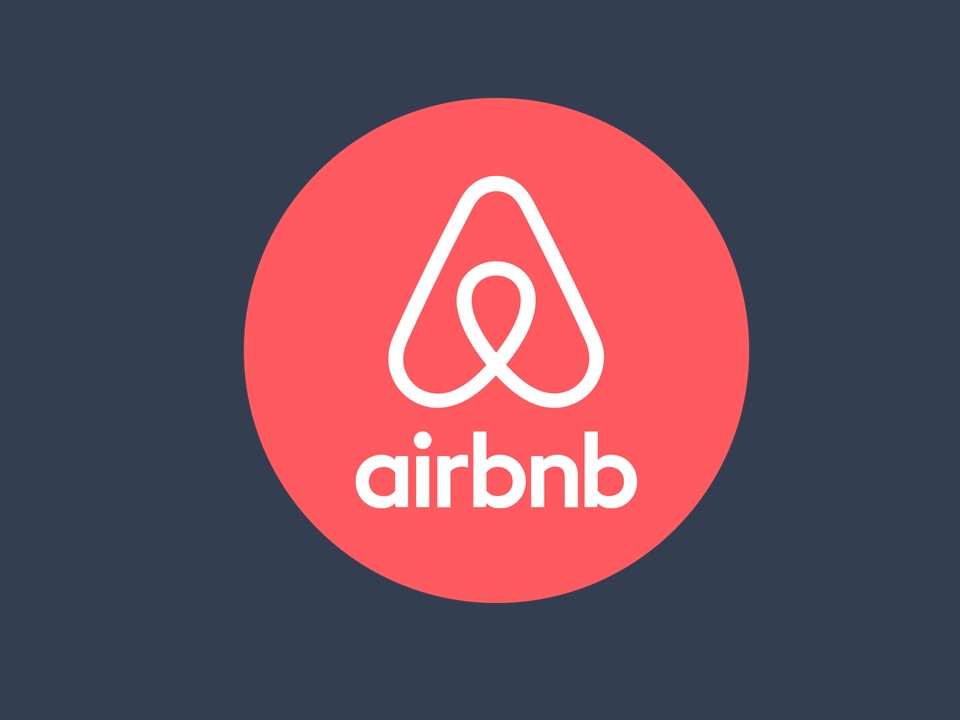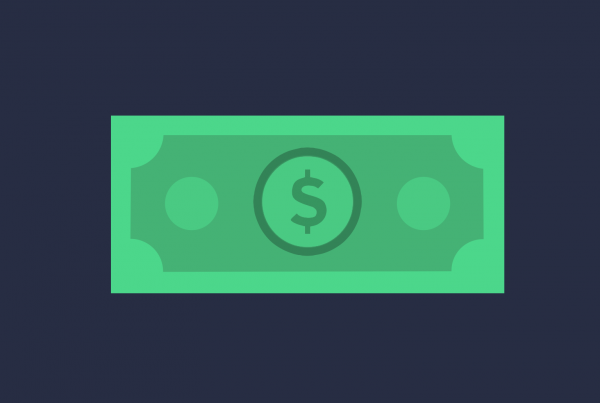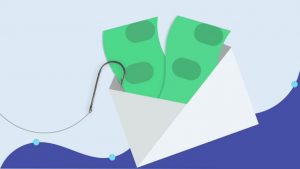 Did you know that less than 24% of sales pitch emails are opened and only 12.5% of first attempts get a response?
Did you know that less than 24% of sales pitch emails are opened and only 12.5% of first attempts get a response?
Let me guess what you’re thinking:
“That’s not a lot.”
So the question is:
How can you craft a cold sales pitch email that actually gets opened and answered?
Inside this infographic and guide, you’re going to learn:
- A simple, proven 4-step process to writing great sales emails from start to finish
- Actionable strategies and “cut-and-paste” formulas
- Real-world examples to guide you along the way
Let’s dive right in…
The Anatomy of a Perfect Sales Pitch Email
Quick jump to sections:
Step 0: How to Find Your Prospect’s Email
Here are 4 proven ways to find the email address of the person you are willing to contact:1) Head over to Any Mail Finder.
2) Use this Google search string:
First, type in the email address you think your prospect uses (Hint: people mostly use variables such as first-name@domain-name.com, or first-name.last-name@domain-name.com, etc) in Google with quotation marks.
Then, check out if an exact match appeared in Google’s search results.
Want an example?
3) Use Noah Kagan’s awesome email permutator spreadsheet (copy).
4) Check out this step-by-step guide.
Step 1: How to Write the Perfect Cold Email Subject Line
Facts
64% of people say they open an email because of the subject line (source).
Personalized subject lines are 22.2% more likely to be opened (Adestra July 2012 Report).
Subject lines with 10 words or more tend to get 46% response rate, as compared to just 24% to subject lines with 10 words or less.
Goal
The goal of your subject line is to get your sales email opened.
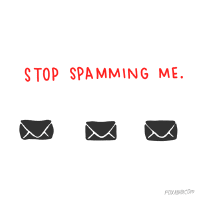
Grab Their Attention
If you want to stand a chance to get that cold email opened, then you need to break away from standard subject lines. Chris explains why it is crucial to craft a subject line that stands out:
Chris Hexton, co-founder at Vero
“The average business email user receives 72 email per day, which is quite a lot of email.
Given that we’re all trying to get to inbox zero more likely than not your emails are going to be pushed aside.
…unless you grab your customers attention!
 In summary, I think few rules to remember when crafting your next subject line are:
In summary, I think few rules to remember when crafting your next subject line are:
- Keep the subject line relevant: If you are sending a password reset email you probably don’t have to make the headline mysterious or catchy…then again, you’re probably not trying to convert customers in your password reset email.
- Make it clear: Give the reader a good idea of what to expect in the email. Presumably, if it’s relevant, it’ll be something they’re interested in.
- Don’t give everything away: Even though you want your customers to know what the email is about you don’t want to reveal the secrets. Build some curiosity so they open the email”.
Now, here are a few specific tactics you can use to grab the attention of your reader:
Use their Name
According to Hubspot, emails that include the first name of the recipient in their subject line have higher click-through rates than emails that don’t.
Apply the Open-Loop Technique
Tell readers just enough to pique their curiosity – and leave them wanting to find out what they’re missing.
“Can I ask you something?”
“What do you think about this?”
“3 mistakes you’re doing with [website]”.
Be Ballsy (But DON’T Over-promise)
“How the heck are you?”
“The best pitch you’ll read this week”
Use Humor
Here’s a solid, fun follow-up email Scott Britton, co-founder at Troops, sent me:
On 19 Oct 2016, at 22:01, Scott Britton wrote:
…
Thought I’d try one more time : )
Let me know if you’re down!
-Scott
Use Power Words That Evoke Emotions
Adding proven, persuasive words in your copy will help you close more deals.
Cold Email Subject Lines That Work (Examples)
“I know you’re busy” formulas
1. [Prospect name], I’ll be quick
2. Got [time needed to read email]?
“Benefit-driven” formulas
3. [Prospect name], I’d like to help you get [result]
4. Two ways we help you get [result]
5. [X] reasons your business [pain point] (and how to fix it)
6. How to [get result] without [pain point]
7. Smart ideas for [company name]
8. What [company name] needs to do better
9. 10x [company name]’s tract in 10 minutes (source)
“Curiosity driven” formulas
10. All you need to know about [product/service]
11. BOOM! This is how you [result wanted]
12. Can I ask you something?
13. Greetings from [your company/your name] (and a small question)
14. Question about [their goal]
15. [Prospect company name]
16. Quick request
“Kind enough to help me” formulas
17. Are you the right person to speak to?
18. [Prospect name], could you help me out?
19. Trying to connect
“Ballsy” formulas
20. The best pitch you’ll read this week
21. That’s one hell of a [result/deal]
22. You suck at [field], here’s why
Step 2: How to Write a Solid Email Introduction
Facts
Goal
The introduction of your introductory sales email has two targets:
1) Grab the attention of your prospect
2) Explain very quickly why you’re sending the email (AKA the reason to connect)
(Otherwise this is what happens, awwwwww):
Make Your Prospect Feel As Personal As possible (Show You Did Research)
For instance, you could mention recent changes that occurred in their life or business (e.g. specific achievements, changes) or points of affinity (e.g. shared interested in sports/hobbies, same hometown…)
Justin Gold, former director of Sales at Poll Everywhere
 Justin explains how to increase your likelihood of connecting with people and moving them down the sales funnel:
Justin explains how to increase your likelihood of connecting with people and moving them down the sales funnel:
“Create the illusion of a personal connection. The best thing to do when sending out emails is to make them feel as personal as possible.
For example: “I am reaching out because I visited your website and realized you don’t have a search bar on your website. I thought that my tool (a search bar) could help give your visitors a better experience and ultimately increase your revenue/customer base”.
Validate Yourself Identifying Similarities With Your Reader
Although personalization is crucial, there’s also for you a strong need to validate yourself.
In a recent HBR article, author Tucker Max explains that when we get an email from a stranger, we want to know who that person is and why that person matters to us.
Tucker Max, author and speaker
 “They don’t know anything about you. You need to show them you’re credible and they can trust you.
“They don’t know anything about you. You need to show them you’re credible and they can trust you.
Knowing someone in common is the strongest form of social proof you can offer. If you have any direct connections, mention them. A mutual friend means you are no longer a stranger.
Lacking that, if you have any authority, credibility, or social status that is relevant to this person and your request, mention it quickly — a line or two should do it […]
If you have no real status, […] find a commonality. Being part of the same group, especially if it’s a personal group, is a core human attraction. Look for unexpected connections, like hometowns and unusual hobbies.
As Adam Grant points out, “Similarities matter most when they’re rare. We bond when we share uncommon commonalities, which allow us to feel that we fit in and stand out at the same time.”
Be Nice (But Don’t Be Sleazy)
“I hope you’re having a wonderful day so far”.
“My name is Don, I work with ABC Marketing and it’ll just take you 40 seconds to read this email”.
Explain Briefly Why You’re Reaching Out
Don’t Use Lame Introduction Phrases
Mike Renahan from HubSpot has listed a few phrases that literately kill an introductory sales email. Here there are:
Mike Renahan, HubSpot
“It all starts with the first email a salesperson sends. This email sets the tone for the relationship going forward, so it’s important to get right […]
Below are 31 commonly-used phrases that kill a relationship from the very first email.
“This is the perfect product for your company.”
“Our product will make you hit your goals.”
“Our product does A, B, C, D, E, F, G, H, …. “
“Do you have problems with X, Y, and Z?”
“I was wondering if you’d be interested.”
Formulas
23. [Friend/connection name] suggested I contact you
24. I hope you’re having a fabulous day so far
25. First and foremost, congratulations on [topic/news/result achieved]
26. I’m a huge fan of [product/service], especially [specific thing you like]
27. Is [issue/burning point] a priority for you now?
28. Are you struggling with [problem]
29. I came across your website and noticed [problems]
30. Hi, my name is [name] and I’m currently [position]. I’ve been following [company for some time now – I love [product]
31. I’ve known about [company] for [time] and it’s great to see [news about them showing you did result]
Step 3: How to Craft an Irresistible Proposal
Facts
Plus:
Nobody cares about you.
So… how do you write an email introducing your company?
Well, bad news:
NOBODY CARES ABOUT YOUR COMPANY.
You write an email offering specific, tangible solutions to your prospect’s problems. It’s not about you, it’s about them.
Goal
The goal of your sales email offer is to:
1) Show our prospect you understand his hopes, fears and dreams.
2) Position your offering in a way that helps him either solve his problem / get more of what he wants. Your offer (service or product) must bring a valuable transformation to your prospect’s life.
Show Them What They’ll Get/Be Able to Do When Using Your Product/Service
Anand Sanwal, CEO at CB Insights
 Anand recently analyzed 147 cold sales emails that his company received after closing a financing round. According to his findings, one of the core weaknesses of bad emails was that the content didn’t get at the What’s In It For me (WIIFM).
Anand recently analyzed 147 cold sales emails that his company received after closing a financing round. According to his findings, one of the core weaknesses of bad emails was that the content didn’t get at the What’s In It For me (WIIFM).
In addition, Anand also found that 76% of emails displayed zero knowledge of his business. Which means it is crucial for you to align your email’s content with your prospect expectations.
In addition, here’s what Joanna from Copyhackers has to say about the WIIFM:
Joanna Wiebe, Copyhackers
 “You may think it’s really important that people upgrade to the latest version of your software or shop your Fall 2012 line. But chances are that, in comparison to the many other things in their inbox, that doesn’t sound that great to them.
“You may think it’s really important that people upgrade to the latest version of your software or shop your Fall 2012 line. But chances are that, in comparison to the many other things in their inbox, that doesn’t sound that great to them.
What pain is grating on them that you can solve right now?
What was of such immense value that you had to email them RIGHT THIS SECOND to share it with them?”.
Show Them What They Can Be
Because the truth is, people buy your product because it provides a transformation.
They buy your product because it helps level up their life. Identify in which aspect of their life are you helping your potential customer:
Become sexier/richer/healthier
More popular
Be the first
Make their life comfortable
Look less lame
Have more freedom
Save money
etc…
Educate Them
One of the major goal of your marketing should be to EDUCATE the customers…..and not just trying to just sell them!
If your prospect isn’t really familiar with your solution (and/or his problems), it is YOUR JOB to give him away enough USEFUL information.
“Education” formulas
32. Surprising insights gained from [experience]
33. Let’s bust some myths about [topic]
34. The top 5 mistakes when it comes to [topic]
“Benefit-oriented” formulas
35. I believe that right now, [prospect company] top [x] concerns are A, B, C
I believe that right now, ABC’s top 2 challenges are:1) Converting trial members into paying customers 2) Increasing email sign-ups
36. There are [x] ways we can get you [result they care about]
37. Based on [thing observed], there’s [X] main challenge you’re looking at.
Based on your website homepage copy, there’s one main challenge you’re looking at: clearly convey your product’s value proposition in a compelling way.
38. We help [target customer] turn [specific problem] into [desired results]
Our company helps businesses just like your double their organic traffic in 3 months so you can get convert more leads into paying customers.
39. We help you get [result] in [length], even if [objection prospect might have]
We help entrepreneurs like you to get their websites load faster (which is important for readers), and you’d free up time that you could use to create new content.
Step 4: How to End Your Cold Email
Facts
According to Boomerang, emails that asked 1-3 questions are 50% more likely to get a response than emails asking no questions. The smaller the ask the easier to answer.
Include a photo in your email signature with an image. It increases chances of getting your email replied to.
Follow-up if you don’t get an answer within a week (AKA “I didn’t want this email to be buried in your inbox”). Approximately 12.5% of first attempts get a response from prospects. Salesforce conducted experiments showing that after three attempts, you are almost 25% likely to get a reply.
Goal
The closing part of your email is where you tell the recipient what to do next (AKA your “call to action”).
Here’s the deal: the goal of your email closer is to get a response.
It could be:
Yes !
or:
NO !
So to a response, you need to ask a very easy and simple question that can be answered by yes, no (or maybe).
It’s simple:
If your question is long-winded, complicated, and require your customer to think about it more than a few seconds, he’ll close that email, think “uuhhh I dunno” and you probably won’t ever get an answer.
Make Your Request Specific, Short and Sweet
When the New York Times ran a cover story on his work, Adam Grant instantly became the guy that “never says no to the five-minute favor, something that will help someone out — an introduction, a quick suggestion — but cost him very little, relative to impact”.
Suddenly, Adam’s inbox exploded with messages from thousands of strangers asking for help.
Here’s what happens next:
Adam Grant, Wharton professor
 ” I noticed that I responded much more quickly to some emails than others—and the ones that elicited fast replies followed the same principles that I studied. Here’s what worked for them, and for me.
” I noticed that I responded much more quickly to some emails than others—and the ones that elicited fast replies followed the same principles that I studied. Here’s what worked for them, and for me.
The longer the message, the longer it took me to read and respond, and the more overloaded my inbox, the less patient I was in reading them. […]
People are more helpful when they’re given clear directions on how to contribute”.
Formulas you can use
Here are a few proven, business email closing phrases you can use:
40. We can discuss the details, of course, but first I wanted to see if this is something you might be interested in?
41. If so, would it be okay if I sent you a few ideas on how I could help?
42. Do you have 10 minutes this week so we can discuss how [your company] can help [prospect company] get more [result]. I’m available [3 options] or I can work around your schedule.
Bonus: Field-Tested Sales Pitch Email Examples
I asked Dmitry Dragilev from JustReachOut if he could contribute to this blog post (and because he’s awesome, he said YES !).
Here’s the email I sent him:
Subject line: uses the open-loop technique
Intro: short and sweet
The ask: to the point
CTA: very simple, easy to answer
Speaking of Dmitry, check out his solid insights:
“Show value up front by doing the grunt work to personalize each outreach email.
I love this email, the guy did the research and knows what I’m into in terms of topics, he is offering value up front and makes it very hard for me not to reply:
Offer value up front in your cold email. I’ll use examples form Bryan Harris, he was my coach for a while and helped me build my business early on”.
Dmitry is the founder of JustReachOut a PR tool which is used by 3000+ SMBs, startups and professionals to pitch journalists and get covered in press without expensive PR firms.
He blogs at CriminallyProlific.
—
What makes Nico Papas’ sales pitch email crazy-effective:
1) Subject line: uses the open loop technique (which favor??? I wanna learn more…)
2) Acknowledge the prospect is busy (“you must be getting hundreds of emails each day”)
3) Subtly use the persuasion principle of reciprocity (I’ll do you a favor, could you do me one as well?)
4) Put himself in he prospect’s shoes, while integrating a strong call-to-action (“would you feel comfortable referring me to the right person?”)
—
What makes this company introduction email good:
The opening paragraph shows that the sender DID research on the company (normal reaction of the prospect: “How did he know we recently hired more support and sales reps?”)
—
What makes Bryan’s email awesome:
1) Rock-solid CTA: “Is this something you guys would be interested in?”
2) Bryan isn’t pushy but uses a strong question that’ll help him qualify his lead (the rospect can either be interested, even just a little bit, or not interested at all).
—
What makes Alicia’s email effective:
1) The use of the open loop technique in her subject line (AKA secrets, what secrets??I want to know more…)
2) Cut thought the chase: I have two ways to make YOU more money. It’s not about her, it’s 100% about the prospect.
Hope you liked and learnt !
[/vc_column_text][/vc_column][/vc_row]

